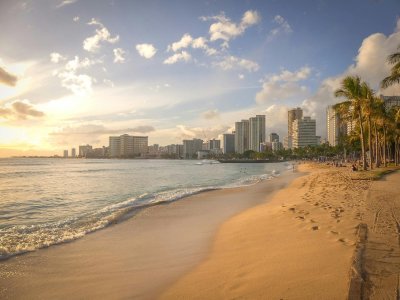Health alert: Virus tied to birth defects and paralysis resurfaces in top travel spot
By
Veronica E.
- Replies 0
For many, Hawaii is the picture of relaxation—gentle waves, warm breezes, and unforgettable views.
But this summer, travelers and locals alike are being encouraged to stay alert as health officials monitor a new concern in the islands.
While the risk remains low for now, it’s a good reminder that even paradise isn’t immune to unexpected challenges—especially when it comes to protecting your health.
So what does this mean for you, and how can you stay safe without canceling your vacation plans?
Here’s what to know.

Zika in Hawaii: what’s happening now
Hawaii has reported its first confirmed case of Zika since 2019, involving a traveler returning from overseas.
Two additional cases are under investigation on Oʻahu’s North Shore, in the peaceful communities of Waialua and Haleʻiwa.
The virus has not been declared locally established, but the presence of Aedes mosquitoes—the primary carriers—means local transmission is still a possibility.
Officials are urging the public to take preventive steps while they continue to monitor the situation.
Also read: Update: CDC urges caution on vaccines for this unfamiliar mosquito-borne illness —Here’s what’s changed.
What to know about the virus
Most people infected with Zika don’t feel any symptoms, but when they do occur, they can include mild fever, rash, red eyes, headaches, and joint or muscle pain.
The real concern lies in its potential long-term complications, such as:
There’s currently no vaccine or cure for Zika.
That’s why public health officials stress prevention above all.
Also read: More victims struck by this virus–what you need to know about the devastating "sloth fever"
Why now—and why here?
Zika has largely stayed under the radar in recent years, with only seven US cases confirmed in 2023.
But the Aedes mosquito is thriving in more places thanks to warmer temperatures and increased rainfall—factors linked to climate change.
These mosquitoes bite during the day, making them harder to avoid than many of us might remember from childhood summer evenings.
And Hawaii’s warm, tropical climate provides ideal breeding conditions.
Also read: Vacation hotspots on high alert as deadly virus claims more victims
Practical tips to protect yourself
Whether you live in Hawaii or plan to visit, here are some straightforward precautions you can take:
Is Zika a concern for older adults?
While Zika poses the greatest danger to pregnant women and unborn babies, it can also cause complications for older adults, particularly those with weakened immune systems or chronic health conditions.
Like many viral illnesses, Zika can take a heavier toll with age—another reason to take preventive steps seriously.
This latest Zika case serves as a reminder that mosquito-borne illnesses are not just a tropical issue anymore.
With shifting climate patterns, experts believe we may see more outbreaks of viruses like Zika, dengue, and chikungunya—even in regions of the US that haven’t faced them before.
Still, there’s no need to panic—just plan wisely, stay informed, and take simple precautions when heading outdoors.
Read next: New virus discovery in uncharted region causes future pandemic concerns–Protect yourself now!

Have you visited Hawaii recently or traveled to other warm destinations? Do you have go-to strategies for avoiding mosquito bites? If you or a loved one have dealt with a mosquito-borne illness, your experience could help others.
Share your tips, stories, or concerns in the comments below. Staying informed is one of the best ways we can support one another—and enjoy our travels safely!
But this summer, travelers and locals alike are being encouraged to stay alert as health officials monitor a new concern in the islands.
While the risk remains low for now, it’s a good reminder that even paradise isn’t immune to unexpected challenges—especially when it comes to protecting your health.
So what does this mean for you, and how can you stay safe without canceling your vacation plans?
Here’s what to know.

A new seasonal health concern has officials urging travelers and locals alike to stay informed and take precautions. Image Source: Pexels / Tyler Lastovich.
Zika in Hawaii: what’s happening now
Hawaii has reported its first confirmed case of Zika since 2019, involving a traveler returning from overseas.
Two additional cases are under investigation on Oʻahu’s North Shore, in the peaceful communities of Waialua and Haleʻiwa.
The virus has not been declared locally established, but the presence of Aedes mosquitoes—the primary carriers—means local transmission is still a possibility.
Officials are urging the public to take preventive steps while they continue to monitor the situation.
Also read: Update: CDC urges caution on vaccines for this unfamiliar mosquito-borne illness —Here’s what’s changed.
What to know about the virus
Most people infected with Zika don’t feel any symptoms, but when they do occur, they can include mild fever, rash, red eyes, headaches, and joint or muscle pain.
The real concern lies in its potential long-term complications, such as:
- Guillain-Barré syndrome, a condition that may lead to temporary paralysis
- Severe birth defects, including microcephaly, if contracted during pregnancy
There’s currently no vaccine or cure for Zika.
That’s why public health officials stress prevention above all.
Also read: More victims struck by this virus–what you need to know about the devastating "sloth fever"
Why now—and why here?
Zika has largely stayed under the radar in recent years, with only seven US cases confirmed in 2023.
But the Aedes mosquito is thriving in more places thanks to warmer temperatures and increased rainfall—factors linked to climate change.
These mosquitoes bite during the day, making them harder to avoid than many of us might remember from childhood summer evenings.
And Hawaii’s warm, tropical climate provides ideal breeding conditions.
Also read: Vacation hotspots on high alert as deadly virus claims more victims
Practical tips to protect yourself
Whether you live in Hawaii or plan to visit, here are some straightforward precautions you can take:
- Use EPA-approved insect repellent, even during the daytime
- Wear long sleeves and pants when possible
- Check door and window screens for holes
- Dump standing water around your home or rental—this includes buckets, birdbaths, and planters
- Practice safe sex if you or your partner have recently traveled to a Zika-affected area
- Watch for symptoms after travel and talk to your doctor if anything feels off
Is Zika a concern for older adults?
While Zika poses the greatest danger to pregnant women and unborn babies, it can also cause complications for older adults, particularly those with weakened immune systems or chronic health conditions.
Like many viral illnesses, Zika can take a heavier toll with age—another reason to take preventive steps seriously.
This latest Zika case serves as a reminder that mosquito-borne illnesses are not just a tropical issue anymore.
With shifting climate patterns, experts believe we may see more outbreaks of viruses like Zika, dengue, and chikungunya—even in regions of the US that haven’t faced them before.
Still, there’s no need to panic—just plan wisely, stay informed, and take simple precautions when heading outdoors.
Read next: New virus discovery in uncharted region causes future pandemic concerns–Protect yourself now!
Key Takeaways
- A case of Zika virus has been confirmed in Hawaii for the first time since 2019, with two more possible cases being investigated on Oʻahu.
- Zika is spread mainly through Aedes mosquitoes and can cause mild symptoms or lead to severe outcomes like birth defects and Guillain-Barré syndrome.
- Hawaii health officials urge residents and visitors to use repellent, wear long clothing, fix screens, and remove standing water to reduce mosquito breeding.
- There is no treatment or vaccine for Zika, and experts warn that warming global temperatures may lead to increased mosquito-borne disease risks in new areas.
Have you visited Hawaii recently or traveled to other warm destinations? Do you have go-to strategies for avoiding mosquito bites? If you or a loved one have dealt with a mosquito-borne illness, your experience could help others.
Share your tips, stories, or concerns in the comments below. Staying informed is one of the best ways we can support one another—and enjoy our travels safely!





